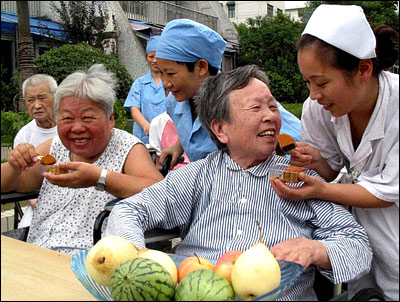Under the planned economy, the government takes care of the pensions, medical service and other benefits of all civil servants, and staff and workers of enterprises and institutions. Anyone employed by a state enterprise or institution could expect life-long security, even if at a low-level. As Chinese society ages, the number of retirees is increasing, and some enterprises have more pensioners than workers on their pay-roll, representing a very great burden. Since the 1990s, China has actively pursued reform of the old-age, unemployment and medical insurance systems. The State Council promulgated the Regulations on Unemployment Insurance, the Interim Regulations on the Collection of Social Insurance Premium, and the Regulations on Guaranteeing Urban Residents' Minimum Standard of Living, providing legal guarantee for implementation of the social security system. Now, quite separate from enterprises and institutions, a social security system under socialized management, integrating old-age, unemployment, medical insurance and minimum standard of living has taken preliminarily shape.
 |
From state- and collective-owned enterprises, social insurance coverage has expanded to non-state enterprises and institutions as well as those who are flexibly employed. The security rights and interests of employees at non-state enterprises are also guaranteed. At the end of 2005, 174.87 million people participated in basic old-age insurance, 137.83 million in medical insurance and 106.48 million in unemployment insurance.
A minimum standard of living system has been established in all cities and county towns, providing a basic guarantee for residents whose families' per capita income is below the lowest local standard. In 2005, there were 22.34 million urban residents receiving such living standard support, and all poor people meeting the standard are covered by insurance. The system is being set up in many rural areas.
Every year, China has a large number of newly emerged urban workers, laid-off workers and surplus rural labor, making for acute employment problems. Whilst continuing to implement positive employment policies and to increase employment and re-employment opportunities, the government is speeding up progress on a social insurance system that protects people's interests and helps build a harmonious society. From 2006 to 2010, the urban unemployment rate will be restricted to five percent.

